Will the global move to phase down HFCs fuel an illicit trade in the refrigerants? If so, what is the HVACR industry doing to curb instances of smuggling and, most importantly, counterfeits, which pose a potentially fatal threat to the general public? Hannah Jo Uy draws key insights from a panel discussion during the 3rd edition of Refrigerants Review, on March 24 in Dubai…
The global move to phase down HFCs is set to create a new set of challenges for the HVACR sector, the most troubling of which could be the illicit traders looking to exploit possible gaps in the countries’ process of transitioning. As the industry navigates the increasingly stringent refrigerant landscape, stakeholders urge the public to be discerning with regard to the available options in the market.
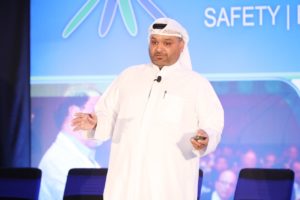
Yaqoub Almatouq
Yaqoub Almatouq, Head of the Negotiations Team to Montreal Protocol; Member, Kuwait National Ozone & Climate Change Committee, Environment Public Authority – Kuwait, pointed out that between 2008 and 2010 authorities in the GCC region reported smuggling of R-11 and R-12. “We think that we will start [to see this kind of activity] again when we come to the HCFCs,” he said. “Rather than stockpiling and buying now – they will start smuggling.” Almatouq believes the same fate can befall HFCs in view of the looming phase-down deadline.
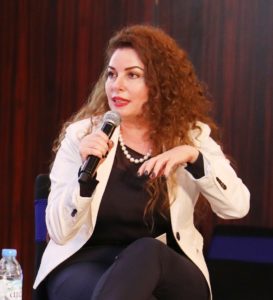
Abier Wasouf
The unregulated market created by customers that turn to illegitimate sources for refrigerants instead of authorised dealers, only aggravates another pressing problem – the proliferation of counterfeit products. Abier Wasouf, Regional Anticounterfeit Counsel – MEA, Danfoss FZCO, has seen, first hand, instances of counterfeiting in the region. For over a decade, she has unravelled the complexities of illicit trade across the region. The work has involved conducting investigations and participating in raids, during which she has seen the great lengths to which traders have gone to avoid detection and to safeguard profits. “In 2017, the impact of counterfeit products on the global economy was worth USD 30-USD 54 billion,” she said, adding that according to the International Chamber of Commerce, the negative impacts of counterfeiting are projected to drain USD 4.2 trillion from the global economy and put 5.4 million legitimate jobs at risk by 2022. The HVACR sector, she pointed out, is not excluded from the statistic. Wasouf added that the profit of traders from counterfeit products is three times more than in the drug trade, while the penalties are “nothing more than a slap on the wrist”, compared to drug-related crimes.
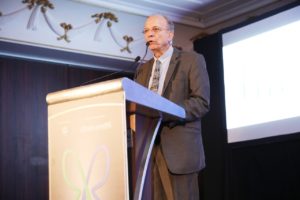
Dr Nacer Achaichia
While the volume of trade in counterfeit refrigerants is well documented the challenge in nabbing the perpetrators is a daunting one. As Dr Nacer Achaichia, Technology Director – EMEA, Honeywell, pointed out, it is difficult to know what’s in the cylinder in the first place. He said the reason why certain refrigerants may be cheap is because they are contaminated, toxic or highly flammable, which poses a grave threat to the public. Mislabelled or misrepresented refrigerants, he said, will then be handled by technicians, who would not be aware of their true qualities, which could result in explosions and, in some instances, fatalities. Amir Naqvi, Regional Business Leader for Fluorine Products, Middle East, Turkey and Africa (META), Honeywell, called the scourge of counterfeit “a menace that haunts the company”. The company, he said, continues to express vigilance in trying to combat counterfeit refrigerants in view of the very real danger they pose to the public.
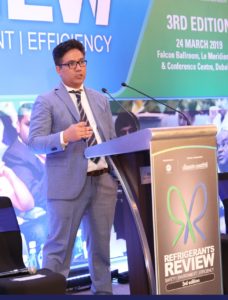
Amir Naqvi
Wasouf added that there should also be greater awareness among the public with regard to counterfeits of the very operating systems carrying the refrigerants. This, she said, has direct and indirect impact on consumers. Providing an example, Wasouf said that the installing and the operating of counterfeit products within the cold chain can damage the integrity of food and medicine and impact the overall health and wellbeing of the people consuming temperature-sensitive products. In addition, doing so could place people at risk of fires and explosions. “Don’t forget,” she cautioned, “the people making these counterfeit products have no technical background.”
In addition to the important issue of safeguarding the public, there are economic consequences. Wasouf pointed out that any brand that is famous and is associated with quality will always be a target for counterfeiters, and that brands that have invested millions in R&D, testing and certification should protect their name in the market. Almatouq added that companies must invest in brand protection, else suffer the negative feedback from those that used counterfeits of their products.
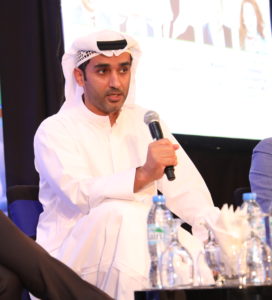
Captain Salem Allooba
In view of the intellectual property, safety and environmental issues associated with counterfeits, police authorities are taking a leadership role in curbing their spread in the market. Captain Salem Allooba, Criminal Investigation Department, Anti-economical department, Dubai Police, said that local authorities take the issue very seriously and that counterfeiting entities often attempt to target the local market in view of Dubai’s strategic position as a transit hub for many international products. Captain Allooba said that Dubai Police, the economic authorities as well as the Customs Department have a consortium to keep the borders of the UAE safe, and that upon complaints they immediately conduct investigations into the matter. He emphasised that every person has the right to have the brand they invested in and no one should take away this right.
A number of companies in the HVACR sector are closely enlisting the help of the police in this regard. Naqvi said that Honeywell is working with the local authorities to curb the issue of counterfeiting, engaging with the Dubai Economic Department and reaching out to relevant authorities in case of incidents. Speaking for Danfoss, Wasouf said that in terms of brand protection, the relationship between brand owner and law enforcement bodies is extremely important. “Most of us, we have the same goal,” she said, adding that there is a need to support each other in training and to facilitate proper exchange of information as well as proper enforcement and partnership in raids.
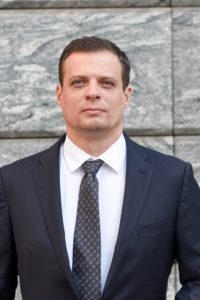
Markus Lattner
Markus Lattner, Director, Eurovent Middle East, advocated the importance of market surveillance and a more industry-wide joint approach, so authorities can benefit from the knowledge of the sector as a whole. He said: “We know most about what’s happening in the market, what is being used, and what is coming in. Perhaps we could exchange experience and define measures and steps to take together to help the situation and reduce the risk, especially with counterfeit refrigerants, which have incremental risk for health and safety.”
In addition to stakeholder engagement, Naqvi said the company is building awareness by leveraging technology through QR codes and looking at how blockchain can be used to protect products in a way that can be recognised by contractors and technicians. This brings another issue to the forefront – that of culture. While recommendations to broaden regulatory schemes to implicate the buyer of counterfeit or contaminated products remain elusive, stakeholders believe that there is a pressing need to create a paradigm shift in the cost-centric thinking that allows for such bad practices. For Wasouf, education and awareness on the need to be wary of counterfeit products should be a cultural movement, as it will take all stakeholders in the market to address the immense issue. Almatouq added, “You have to teach the buyer and supplier ethics of trade.”
While there are challenges, there are just as many solutions, provided stakeholders work together now, before what is merely a lurking threat becomes a tragic headline.
Copyright © 2006-2025 - CPI Industry. All rights reserved.